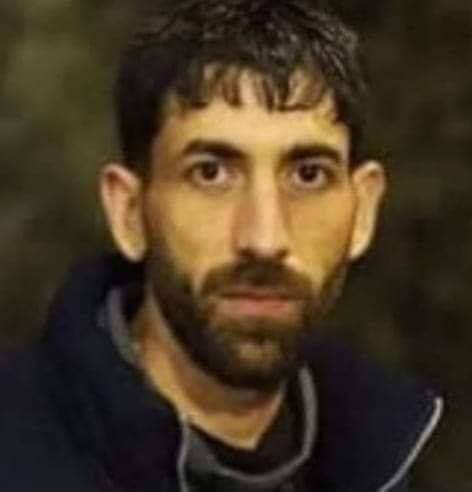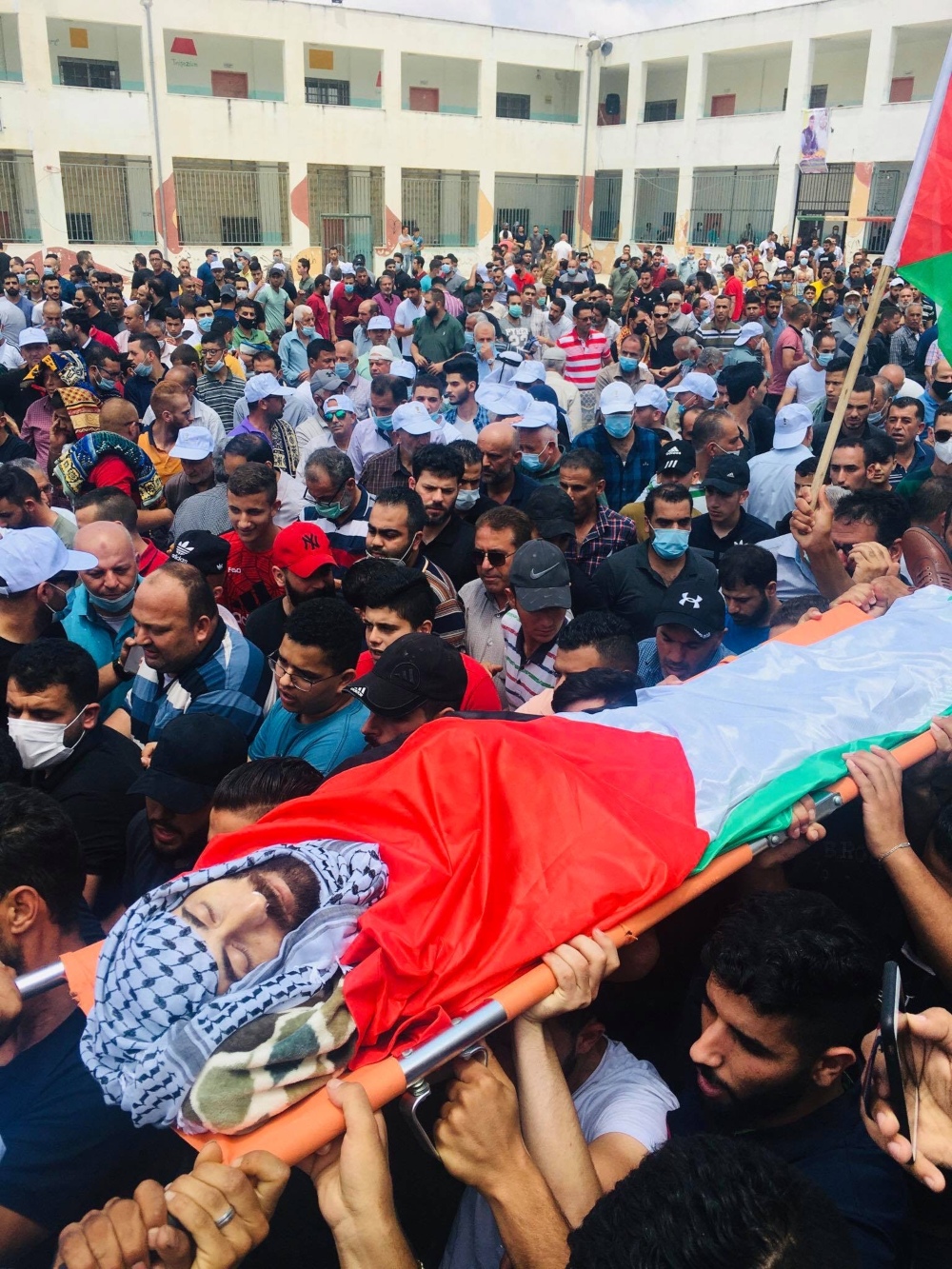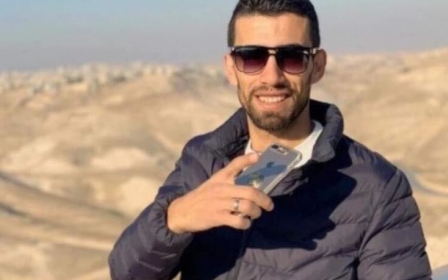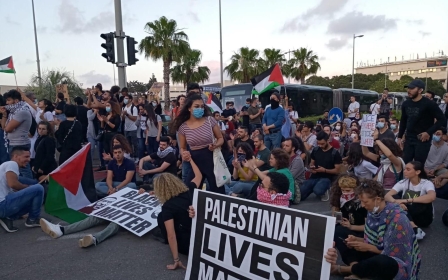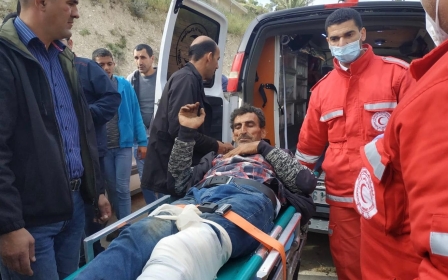West Bank village mourns Palestinian killed by Israeli forces on nighttime stroll
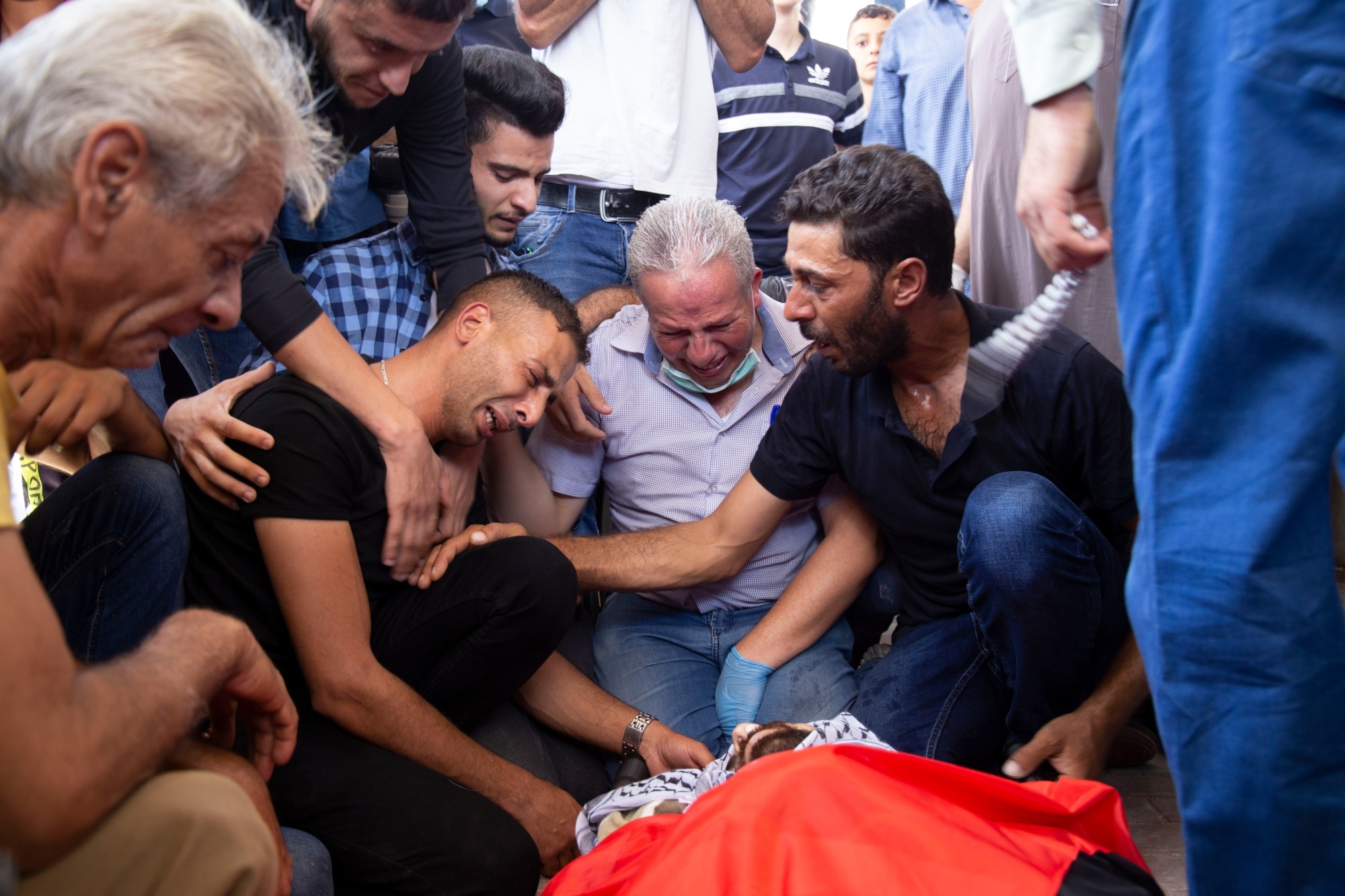
It was about 10pm on a Thursday night and Haitham Abu Hammad was taking a nighttime stroll with his friend Ibrahim Abu Yaaqoub, 32, along the main road of their village, Kifl Haris, in the northern occupied West Bank district of Salfit.
The pair had been bored at home, and thought they’d pass the time by taking a walk to their friend’s house down the road.
Halfway there, in the middle of conversation, Haitham and Ibrahim heard the sound of a gunshot. Before Haitham knew what was happening, Ibrahim stumbled, clutching his neck.
“He grabbed onto me and started saying ‘I’ve been shot’,” Abu Hammad told Middle East Eye, recounting the events of the previous night. “He gave me his phone and told me to call his family and tell them what happened to him.”
New MEE newsletter: Jerusalem Dispatch
Sign up to get the latest insights and analysis on Israel-Palestine, alongside Turkey Unpacked and other MEE newsletters
As Ibrahim lay on the pavement, blood spilling from his neck, Abu Hammad frantically looked around for whoever had shot his friend, trying to make sense of what happened.
“I couldn’t see the soldiers anywhere,” he said, speculating that Ibrahim was shot by an Israeli sniper positioned somewhere in a nearby olive grove. “It all happened out of nowhere.”
As Abu Hammad cried out for help, neighbours helped the pair into vehicles and began speeding towards the main entrance of Kifl Haris, just 500 metres away.
But when they arrived, they found that Israeli soldiers had closed the steel gate at the entrance of the village.
“As soon as we arrived, the soldiers stationed at the (nearby) military tower started firing towards our cars, forcing us to turn around and take the back roads to the Salfit hospital,” Abu Hammad said.
“By the time we finally arrived, Ibrahim was on his last dying breath,” he said, choking through tears.
According to Abu Hammad, what should have been a five-minute drive to the Salfit governmental hospital ended up taking close to 20 minutes.
“Maybe if we had gotten to the hospital faster, we could have saved him,” Abu Hammad said.
“I don’t know, I just don’t know what to say.”
The Israeli military later confirmed that it had shot at two people that night in the village.
Killed in ‘cold-blood’
On Friday afternoon, hundreds of Palestinians gathered in the main square in Kifl Haris for Ibrahim’s funeral procession.
As they marched down the main road to the village cemetery carrying his body wrapped in a Palestinian flag, friends and family chanted slogans against the Israeli occupation and prayers for his safe passage into heaven.
“We are devastated, absolutely shocked,” Rami Abu Yaaqoub, Ibrahim’s cousin, told MEE. “Ibrahim was loved by everyone. He was hard-working, self-made, and had big goals for his life.”
According to Rami, Ibrahim was the primary caretaker of his widowed mother, who has a number of chronic health issues including diabetes and hypertension.
“His mother is beside herself. She doesn’t know what to do,” Rami said.
According to locals, another youth from Kifl Haris, identified as 17-year-old Mohammed Abd al-Salam, was shot in the legs close to the permanent military tower at the entrance to the village. He was reportedly denied medical care from the soldiers, and locals were similarly prevented from taking him to the hospital.
Only when Palestinian ambulances arrived was Abd al-Salam allowed to be evacuated to the hospital.
Following Ibrahim’s killing, the Israeli army claimed it opened fire in response to "two assailants throwing Molotov cocktails".
‘They didn’t have to kill him’
- Rami Abu Yaaqoub, cousin of slain Palestinian
But his friends and family strongly rejected these accusations.
“We were just walking to go to our friend’s house,” Abu Hammad said, adding that he hadn’t heard any sort of commotion or clashes with soldiers before Ibrahim was shot.
“We were not throwing stones or Molotov cocktails, and we didn’t hear or see anyone else doing that either,” he said.
Rami Abu Yaaqoub pointed to the fact that Ibrahim and Haitham were both walking on the main road of the village, which is well-lit with a number of street lights.
“They were walking in perfect visibility,” he said. “Wherever the soldiers were, they would have been able to see Haitham and Ibrahim clearly. If Ibrahim was throwing any kind of stones or something at the soldiers, they could have fired warning shots, or gone to arrest him. They didn’t have to kill him.”
The fact that Ibrahim was shot in the neck, Abu Yaaqoub said, proved that he was “executed”.
“He was shot in cold blood by a sniper whose one goal was to kill. They killed Ibrahim not because of who he was, or because he was dangerous to them. They killed him because he was Palestinian.”
A history of intimidation
Ibrahim’s death comes on the heels of a tense week in Kifl Haris, according to locals, who say Israeli soldiers have been terrorising them for several days.
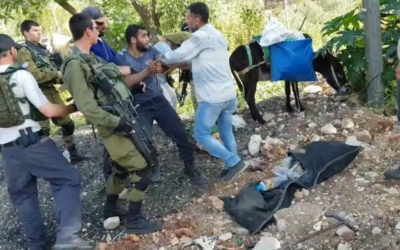
“In general, Kifl Haris has always had problems with the Israeli soldiers and settlers due to its religious and historical significance,” Rami Abu Yaaqoub told MEE.
Kifl Haris is an ancient Canaanite village, with religious and archaeological sites dating back hundreds, even thousands of years.
The village is home to what locals believe is the ancient shrine of Muslim prophet Thul-Kifl. The site is also believed by Jews to be the tomb of the biblical Joshua.
“For years the settlers have tried to claim this holy site as their own, and are constantly raiding the village under the protection of the soldiers to visit the site and pray there,” Abu Yaaqoub said.
“Every few weeks, groups of settlers come to the village to pray at the shrine, and the soldiers shut down our town, restrict our movement, fire tear gas, sound bombs, and use violent force against us,” he continued.
Just last month, settlers and soldiers were documented raiding Kifl Haris, shouting anti-Palestinian slurs as they passed through the village on the way to the shrine.
While the residents are used to Israeli incursions, in recent days soldiers have been stepping up their attacks on the village.
“Over the past week, soldiers have been raiding the village every night, into the early hours of the morning, firing sound grenades close to the houses, and scaring the townspeople,” Rami Abu Yaaqoub said, adding that his children have started sleeping in his room out of fear of the nightly raids.
In addition to the raids, Abu Yaaqoub said soldiers have been closing the main gate to the village more often as a “provocation”, and on a number of occasions, have patrolled the streets of the village in their military jeeps, shouting profanities over loudspeakers.
“This harassment is all part of Israel’s routine, and their policy to make life so hard for us Palestinians that we will leave our lands,” he said.
‘We demand accountability’
As the family processes the death of their son, Rami and other cousins of Ibrahim have been urging the young man’s relatives to begin the proceedings of filing a complaint against the soldiers.
‘It shouldn’t be illegal to take a walk with your friends, but in Palestine, it can get you killed’
- Rami Abu Yaaqoub
“We demand that an investigation be opened into Ibrahim’s killing,” Rami said, adding that while he didn’t have much faith in the Israeli justice system, “we need to try to hold someone accountable”.
“The killing of Ibrahim was a crime. It was a cold-blooded killing,” he said, choking up. “There is no excuse for the soldiers to use such excessive force against us, time and time again.”
Abu Yaaqoub urged the international community to take action, and hold Israel accountable for its “crimes against humanity, which they commit on a daily basis”.
“Ibrahim left his house to go visit his friend, and came back a martyr. This kind of tragedy only happens in Palestine,” he said.
“To the international community, and to all the people who claim to believe in human rights, look at what is happening in Palestine,” he said. “We are an oppressed people, under occupation, with no means to defend ourselves and our homeland.”
“He was going on a stroll with his friends. It shouldn’t be illegal to take a walk with your friends, but in Palestine, it can get you killed.”
Middle East Eye delivers independent and unrivalled coverage and analysis of the Middle East, North Africa and beyond. To learn more about republishing this content and the associated fees, please fill out this form. More about MEE can be found here.


